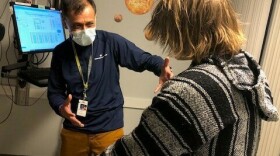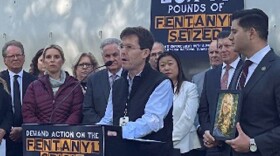Martha Bebinger
[Copyright 2024 NPR]
-
Some doctors are promoting propellant-free inhalers over puff inhalers that emit greenhouse gases. Climate change can exacerbate respiratory ills because of more fires, air pollution and allergens.
-
The surge in overdose deaths among teens is opening a new path to treatment: pediatricians. A doctor in Massachusetts shows how it works with a 17-year-old patient.
-
Fentanyl fueled unprecedented carnage with 112,000 fatal overdoses. The nation is increasingly divided over how to respond.
-
Renae was so desperate to keep her child alive when so many others have died from overdose that she resorted to extreme measures — and extreme risks. She now supervises drug use in her own home.
-
Turns out diners are more likely to get on board for altruistic reasons rather than health. That's what one hospital learned after it pledged to reduce food-related greenhouse gas emissions.
-
The medical dangers of heat are real. But people often ignore public heat alerts, or don't know how vulnerable they are. A new alert system prompts clinicians to talk about heat with patients.
-
It can be heartbreaking to let go of a hand-made rug or sweater that a loved one didn't quite finish. A group of volunteer knitters, quilters and other crafters offer some closure.
-
Federal restrictions seemed to explain why many doctors weren't prescribing medication for opioid addiction. But some caution that removing those rules isn't enough to overcome hesitancy and stigma.
-
At many U.S. hospitals, children and teens are stuck in the emergency department for days or weeks because psychiatric beds are full. Massachussets has a simple, yet promising solution.
-
U.S. overdose deaths have exceeded 100,000 a year, yet few hospitals are equipped to treat patients with addiction. A new kind of treatment team connect patients with help before they're discharged.











